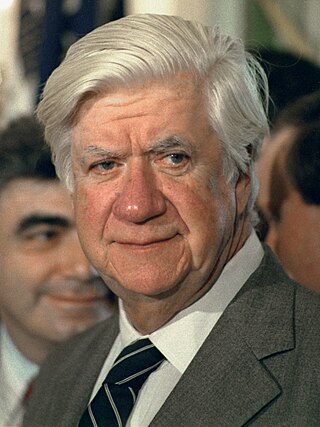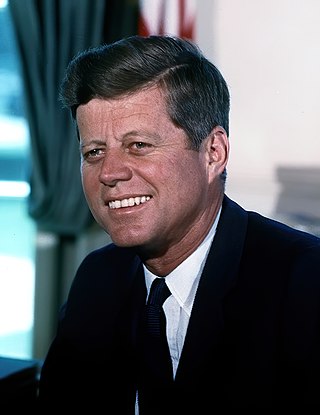
The Kennedy family is an American political family that has long been prominent in American politics, public service, entertainment, and business. In 1884, 35 years after the family's arrival from County Wexford, Ireland, Patrick Joseph "P. J." Kennedy became the first Kennedy elected to public office, serving in the Massachusetts state legislature until 1895. At least one Kennedy family member served in federal elective office from 1947, when P. J. Kennedy's grandson John F. Kennedy became a member of Congress from Massachusetts, until 2011, when Patrick J. Kennedy II retired as a member of the U.S. House of Representatives from Rhode Island.

Thomas Phillip "Tip" O'Neill Jr. was an American Democratic Party politician from Massachusetts who served as the 47th speaker of the United States House of Representatives from 1977 to 1987, the third-longest tenure in history and the longest uninterrupted tenure. He represented northern Boston in the House from 1953 to 1987.

Caroline Bouvier Kennedy is an American author, diplomat and attorney serving as the United States ambassador to Australia since 2022. Kennedy previously served in the Obama administration as the United States ambassador to Japan from 2013 to 2017. Most of Kennedy's professional life has been in literature, law, politics, education reform, and charity. She is a member of the Kennedy family and the only surviving child of US president John F. Kennedy and First Lady Jacqueline Kennedy.

Ethel Kennedy was an American human rights advocate. She was the wife of U.S. senator Robert F. Kennedy, a sister-in-law of U.S. president John F. Kennedy, and a daughter of businessman George Skakel.

The John F. Kennedy Presidential Library and Museum is the presidential library and museum of John Fitzgerald Kennedy (1917–1963), the 35th president of the United States (1961–1963). It is located on Columbia Point in the Dorchester neighborhood of Boston, Massachusetts, next to the University of Massachusetts at Boston, the Edward M. Kennedy Institute for the United States Senate, and the Massachusetts Archives and Commonwealth Museum. Designed by the architect I. M. Pei, the building is the official repository for original papers and correspondence of the Kennedy Administration, as well as special bodies of published and unpublished materials, such as books and papers by and about Ernest Hemingway.

The Profile in Courage Award is a private award created by the Kennedy family to recognize displays of courage similar to those John F. Kennedy originally described in his book of the same name. It is given to individuals who, by acting in accord with their conscience, risked their careers or lives by pursuing a larger vision of the national, state or local interest in opposition to popular opinion or pressure from constituents or other local interests.

The Resolute desk, also known as the Hayes desk, is a nineteenth-century partners desk used by several presidents of the United States in the White House as the Oval Office desk, including the five most recent presidents. The desk was a gift from Queen Victoria to President Rutherford B. Hayes in 1880 and was built from the oak timbers of the British Arctic exploration ship HMS Resolute. The 1,300-pound (590-kilogram) desk was created by William Evenden, a skilled joiner at Chatham Dockyard in Kent, probably from a design by Morant, Boyd, & Blanford. The desk has been modified twice, with a kneehole panel added in 1945 and a 2-inch-tall (5.1 cm) plinth added to the desk in 1961.

"High Hopes" is a popular song first popularized by Frank Sinatra, with music written by James Van Heusen and lyrics by Sammy Cahn. It was introduced by Sinatra and child actor Eddie Hodges in the 1959 film A Hole in the Head, was nominated for a Grammy, and won an Oscar for Best Original Song at the 32nd Academy Awards.

John Fitzgerald Kennedy, also known as JFK, was the 35th president of the United States, serving from 1961 until his assassination in 1963. He was the youngest person elected president. Kennedy served at the height of the Cold War, and the majority of his foreign policy concerned relations with the Soviet Union and Cuba. A Democrat, Kennedy represented Massachusetts in both houses of the United States Congress prior to his presidency.

Nantasket Beach is a beach in the town of Hull, Massachusetts. It is part of the Nantasket Beach Reservation, administered by the state Department of Conservation and Recreation. The shore has fine, light gray sand and is one of the most highly rated beaches in Greater Boston. Due to its gentle slope, at low tide, the beach extends several hundred yards in width, forming tide pools that have become a well known, picturesque characteristic of the site, renowned for their reflections of the sunsets and sunrises. The northern part of the beach is private, administered by the Town of Hull, and does not allow visitors to park except as guests of residents. The beach is a habitat for federally protected species, including the piping plover, least tern, and occasionally harbor seals.

The Fulbright–Hays Act of 1961 is officially known as the Mutual Educational and Cultural Exchange Act of 1961. It was marshalled by United States Senator J. William Fulbright (D-AR) and passed by the 87th United States Congress on September 16, 1961, the same month the Foreign Assistance Act of 1961 and Peace Corps Act of 1961 were enacted.

Robert Francis Kennedy, also known as RFK, was an American politician and lawyer. He served as the 64th United States attorney general from January 1961 to September 1964, and as a U.S. senator from New York from January 1965 until his assassination in June 1968, when he was running for the Democratic presidential nomination. Like his brothers John F. Kennedy and Ted Kennedy, he was a prominent member of the Democratic Party and is considered an icon of modern American liberalism.

The inauguration of John F. Kennedy as the 35th president of the United States was held on Friday, January 20, 1961, at the East Portico of the United States Capitol in Washington, D.C. This was the 44th inauguration and marked the commencement of John F. Kennedy's and Lyndon B. Johnson's only term as president and vice president. Kennedy was assassinated 2 years, 306 days into this term, and Johnson succeeded to the presidency.

Rose Elizabeth Fitzgerald Kennedy was an American philanthropist, socialite, and matriarch of the Kennedy family. She was deeply embedded in the "lace curtain" Irish-American community in Boston. Her father, John F. Fitzgerald, served in the Massachusetts State Senate (1892–1894), in the U.S. House of Representatives, and as Mayor of Boston. Her husband, Joseph P. Kennedy Sr., chaired the U.S. Securities and Exchange Commission (1934–1935) and the U.S. Maritime Commission (1937–1938), and served as United States Ambassador to the United Kingdom (1938–1940). Their nine children included United States President John F. Kennedy, U.S. Senator Robert F. Kennedy of New York, U.S. Senator Ted Kennedy of Massachusetts, Special Olympics founder Eunice Kennedy Shriver, and U.S. Ambassador to Ireland Jean Kennedy Smith. In 1951, Rose Kennedy was ennobled by Pope Pius XII, becoming the sixth American woman to be granted the rank of Papal countess.
"Thousands Are Sailing" is a song by The Pogues, released in 1988. The song is an Irish folk style ballad, written by Phil Chevron, and featured on The Pogues' album If I Should Fall from Grace with God.

Jean Ann Kennedy Smith was an American diplomat, activist, humanitarian, and author who served as United States Ambassador to Ireland from 1993 to 1998. She was a member of the Kennedy family, the eighth of nine children, and youngest daughter, born to Joseph P. Kennedy Sr. and Rose Fitzgerald. Her siblings included President John F. Kennedy, Senator Robert F. Kennedy, Senator Edward M. Kennedy, Rosemary Kennedy, and Special Olympics founder Eunice Kennedy Shriver. She was also a sister-in-law of Jacqueline Kennedy.

Pushinka, a dog, was given by the Soviet Premier Nikita Khrushchev to the President of the United States, John F. Kennedy, in 1961. Pushinka was the daughter of Strelka, who had travelled into space aboard Korabl-Sputnik 2.

"Johnny, We Hardly Knew Ye": Memories of John Fitzgerald Kennedy is a 1972 memoir of John F. Kennedy, written by two of his closest friends and advisors, David Powers and Kenneth O'Donnell, in collaboration with journalist Joe McCarthy. The book was a best-seller and was later adapted into a television movie of the same title in 1977.
The ancestral background of presidents of the United States has been relatively consistent throughout American history. The most common ancestry of U.S. presidents is English, due to its origins as a group of former English colonies. With the exception of Martin Van Buren and possibly Dwight D. Eisenhower, every president has ancestors from the British Isles; Van Buren was of Dutch lineage and Eisenhower was of German and Swiss heritage. John F. Kennedy and Donald J. Trump are the only known presidents who did not have ancestors who arrived during the colonial period. Barack Obama is thus far the only president to have ancestry from outside of Europe; his paternal family is of Kenyan Luo ancestry. He is also believed to be a direct descendant of John Punch, a colonial-era slave born in modern-day Cameroon. There is no evidence that any president has had Indigenous American ancestry.
















